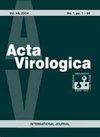RPS3-induced antiviral cytokines inhibit the proliferation of classical swine fever virus.
IF 0.8
4区 医学
Q4 VIROLOGY
引用次数: 4
Abstract
Classical swine fever virus (CSFV) infection results in serious economic losses to the pig industry. This positive-sense RNA virus hijacks cell host proteins for its own replication. Although previous studies have shown that RPS3, a 40S ribosomal subunit protein, is mainly required for DNA repair, apoptosis and inflammation, the effect of RPS3 on CSFV replication remains uncertain. Thus, we investigated the potential role of RPS3 in CSFV infection in RPS3-knockdown and -overexpressing cell lines using real-time fluorescence quantitative PCR (RT-qPCR) and indirect immunofluorescence assays. Results showed that knockdown of RPS3 by lentiviruses enhanced CSFV replication, whereas overexpression of RPS3 by lentiviruses inhibited CSFV replication. These findings indicated the antiviral role of RPS3 in CSFV infection. Subsequent experiments revealed that CSFV replication was inhibited in cells cultured with the supernatants of RPS3-overexpressing cell, suggesting that the RPS3-mediated inflammatory response was involved in CSFV infection. Furthermore, enzyme-linked immunosorbent assay (ELISA) revealed that the secretion of antiviral cytokines (IL-8 and INF-β) was increased in cells with sufficient RPS3 expression but decreased in cells lacking RPS3 expression. RT-qPCR and immunofluorescence assays revealed that CSFV infection inhibited RPS3-mediated antiviral cytokine secretion. Taken together, these findings reveal that RPS3 is a novel antiviral factor that inhibits CSFV proliferation by increasing antiviral cytokine secretion. Keywords: classical swine fever virus; ribosome protein S3; IL-8; INF-β.rps3诱导的抗病毒细胞因子抑制猪瘟病毒的增殖。
猪瘟病毒(CSFV)感染给养猪业造成严重的经济损失。这种正义RNA病毒劫持细胞宿主蛋白进行自身复制。虽然已有研究表明RPS3是一种40S核糖体亚基蛋白,主要参与DNA修复、细胞凋亡和炎症反应,但RPS3对猪瘟病毒复制的影响尚不确定。因此,我们利用实时荧光定量PCR (RT-qPCR)和间接免疫荧光法研究了RPS3在猪瘟病毒感染中的潜在作用。结果表明,慢病毒敲低RPS3可增强猪瘟病毒的复制,而过表达RPS3可抑制猪瘟病毒的复制。这些发现提示RPS3在猪瘟感染中的抗病毒作用。随后的实验发现,用rps3过表达细胞的上清液培养的细胞可以抑制猪瘟病毒的复制,这表明rps3介导的炎症反应参与了猪瘟病毒感染。此外,酶联免疫吸附试验(ELISA)显示,抗病毒细胞因子(IL-8和INF-β)在RPS3表达充足的细胞中分泌增加,而在RPS3缺乏表达的细胞中分泌减少。RT-qPCR和免疫荧光检测显示猪瘟病毒感染抑制rps3介导的抗病毒细胞因子分泌。综上所述,这些发现表明RPS3是一种新的抗病毒因子,通过增加抗病毒细胞因子的分泌来抑制猪瘟病毒的增殖。关键词:猪瘟病毒;核糖体蛋白S3;引发;正-β。
本文章由计算机程序翻译,如有差异,请以英文原文为准。
求助全文
约1分钟内获得全文
求助全文
来源期刊

Acta virologica
医学-病毒学
CiteScore
3.10
自引率
11.80%
发文量
43
审稿时长
>12 weeks
期刊介绍:
Acta virologica is an international journal of predominantly molecular and cellular virology. Acta virologica aims to publish papers reporting original results of fundamental and applied research mainly on human, animal and plant viruses at cellular and molecular level. As a matter of tradition, also rickettsiae are included. Areas of interest are virus structure and morphology, molecular biology of virus-cell interactions, molecular genetics of viruses, pathogenesis of viral diseases, viral immunology, vaccines, antiviral drugs and viral diagnostics.
 求助内容:
求助内容: 应助结果提醒方式:
应助结果提醒方式:


